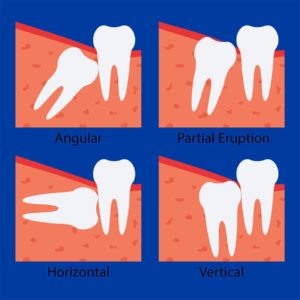B & F Dental Clinic – Patient Information Series
All About Wisdom Tooth Extraction In Singapore
Why Choose
B & F Dental Clinic for your wisdom tooth removal?
What are wisdom teeth?

Do I Have Wisdom Teeth?
Most adults have 32 permanent teeth. The third permanent molars which are also known as the wisdom teeth, usually erupt between the ages of 16 and 21. However, our jaw may not have enough space for these teeth to come out normally.
When that happens, they may be blocked from erupting fully in the mouth. In these cases, we call them impacted wisdom teeth.

Types of Impacted Wisdom Teeth
You may be surprised to learn that there are different types of wisdom teeth impaction.
Partially Impacted – The tooth can erupt showing only a small portion of the tooth crown above the gums.
Fully Impacted – The tooth may never emerge or show through the gums at all.
A wisdom tooth may also grow away from the second molar, or grow horizontally, almost as if it is sleeping. Depending on the direction, we may call it mesially, vertically or distally impacted.

Why Should I Extract My Wisdom Teeth?
Impacted teeth can form food trap areas which are almost impossible for you to clean. This can result in hidden cavities between your molar teeth that can cause severe pain when the nerve becomes infected.
There is a chance of cyst formation around an unerupted tooth that may cause damage to the teeth and bone.
It is common to get gum infection around a partially erupted tooth due to poor hygiene in the area. This can result in gum swelling and pain.
They are strongly linked to cavities on important permanent molars, cyst formation and infection. Some people feel that it causes them crowding of their teeth although the scientific evidence is not definitive.
Common Questions
"Can't I wait till the tooth has a problem before extracting it?"
Of course you can! But it can be a very bad idea.
The nearby teeth often have suffered irreversible damage by the time you are actually having pain! Bacteria affecting and rotting the wisdom tooth can often affect the permanent second molar tooth in front as well. This is an important chewing tooth that you would hope to keep for a very long time. When this happens, you would often need a root canal treatment and a crown for the molar that you want to keep. In complex cases or if the tooth is too badly decayed, you may lose your permanent second molar teeth.
We often notice that dental problems like these often develop quietly over time and often flare up unexpectedly in a sudden burst of pain. When such problems and pain occur, it often causes distress and problems to you as it may disrupt your schedule in an unplanned way.
The cost of delayed treatment is often higher than planned early treatment as well.

Early prevention is better than a late cure!
B & F Dental Clinic

plan of action
What is the Wisdom Tooth Removal Procedure like?
At B & F Dental, we would first do a comprehensive examination and take x-rays of your teeth. Depending on the condition of your teeth and jaws, our dentist may recommend surgery OR normal wisdom tooth extraction as required.
Your dentist will give you specific advice as required before your surgery, as well as answer any questions or concerns you may have. You may also tell the dentist about any fears or concerns that you may have for the procedure.
There are a few basic things you can do to prepare for the procedure to make yourself more comfortable.
01
Have a light meal 2-3 hours before The Surgery
You may be tired and sore after the treatment and your jaw may still be numb for 2-3 hours. However, do not overeat immediately before the surgery as you may feel nauseous during the procedure if too full.
02
Try To Have Someone To Accompany You Home Afterwards.
Most people are fine after the surgery and you will be allowed to rest for a while if needed. However, it is good to have someone along to help you collect the medications and guide you home as you may be tired after the surgery and anaesthesia.
03
Brush well before you go for your surgery.
A clean mouth will reduce the chances of wound infection after wisdom tooth surgery.
plan of action
What Should I Expect For A Wisdom Tooth Surgery?
Wisdom tooth removal is a minor surgical procedure that is done under local anaesthesia by many people. If you have further concerns or nervousness, you can discuss other options with your dentist.
The surgeon will numb the mouth and jaw to minimize pain and discomfort. In our clinic, we sometimes opt to give painkillers before the surgery to minimize discomfort even further on a case-by-case basis.
The gums are lifted to uncover the wisdom teeth and bone obstructing removal. The tooth is sectioned (cut) to allow ease of removal. Once completed, we check for any debris and do basic clean-up before stitching the gums back to where they are supposed to lie.
You will be lying down for the procedure. The jaw and gums will be numb, and you may hear some buzzing noises or experience a salty taste in your mouth. That will be from the sterile saline rinse we use to wash the area with.
This is often done as an outpatient procedure. You are able to go home on the same day.

How Much Downtime Will I Need?
Most people are able to speak and move about just fine after wisdom tooth surgery! However, you should not expect to be doing active leisure activities like shopping or sports immediately after the procedure.
We understand that many would need to rest after such a procedure and normally we would issue about a week’s medical leave for such procedures unless you request that you do not need it.

Post-Surgical Management
Wisdom teeth surgery may result in slight or minor bleeding from the extraction wound, which is normally controlled with pressure from biting on gauze.
You should have a good rest for the remainder of the day.
While you are resting, you should be careful to observe the following:
- Using a straw for drinks
- Violent / Forceful rinsing of the mouth
- Exercise or strenuous activity
- Smoking excessively (best to abstain)
The empty socket where the wisdom tooth was removed will be filled with blood which forms a blood clot. This allows the body to heal and close up the space.
Such activities may cause the blood clot to dislodge / fall out and expose the bone and sensory nerve endings. Inflammation or irritation at this area can cause a very painful condition called dry socket which tends to happen after 2 – 3 days. Contact your dentist immediately if you believe you may have dry socket.
"Can I brush my teeth after the surgery?"
Yes you can! But you should avoid the surgery site for at least a few days as you may tear the wound and stitches. If unsure, you can brush parts of the mouth far from the surgery area and use the supplied antiseptic mouthwash which we normally prescribe to gently rinse for a few days.
Aftercare and Management of Pain
You may expect some pain or minor swelling over the next 24 – 72 hours.
This can be reduced by medication prescribed to you.
You can also use an ice pack on the outside of the cheek for short intervals of about five minutes. This may relieve pain and discomfort for the first 24 hours.
Medication for pain relief should be taken according to the directions given.
You are usually advised not to take them on an empty stomach as they can sometimes cause stomach upset. Some of these medications may make you sleepy or drowsy.
Please avoid driving or operating heavy machinery if so.
During the recovery period, it is critical to maintain good oral hygiene to avoid or reduce the chances of infection. Please use a soft brush to brush and clean teeth that are away from the surgical area and use the prescribed mouthwash or salt water to gargle.
If you are prescribed antibiotics, please remember to complete the course of medication as bacterial resistance may occur and further infection of the wound may prove more difficult to treat.
Your dentist will normally give you a review appointment after 5 – 7 days to check the wound and remove stitches if required. We do use dissolvable stitches in some cases but we usually prefer to remove them earlier at the review appointment to improve your comfort.
What Can I Eat?
There is no real diet restriction for wisdom teeth surgery. However, you may want to blend or mash your foods to a soft consistency so you can swallow them without chewing hard.
We also strongly advise to avoid foods like nuts or chili bits that can get stuck in the wound and cause severe discomfort. It is not uncommon for our patients to return with severe pain because of a chili seed stuck in the extraction wound.
Our Instructions For You
Wisdom Tooth Surgery After-Care Instructions:
You should have a soft diet for a few days after the operation. Take nutritious drinks and soups / porridge as you can tolerate. Avoid eating on the surgery wound sites and avoid eating foods that cannot be cleaned out of the wound easily (eg. nuts). Do not bite on anything harder than scrambled eggs at the surgical site.
Common Concerns
- What do I do if there is bleeding?
- Can I exercise or go out?
- Can I smoke / drink alcohol?
- How long will it take to heal?
- Can I talk after the procedure?
- Can I brush my teeth?
- Will it be painful when I go home?
Apply pressure with clean gauze if there is bleeding.
It is advisable to plan for a restful day at home either napping or watching TV after the procedure rather than going out. Strenuous exercise can induce bleeding or disturb / tear the stitches.
Alcohol and smoking are discouraged as they may impair healing or result in irritation / pain at the area.
The wound will slowly close over 2 – 3 weeks and disappear in 3 – 6 months’ time.
Yes you can talk after the procedure but your lip may still be numb.
There may be some pain at night when the painkillers wear off so do take them at the prescribed intervals.
Rest Quietly
Avoid Smoking / Alcohol
Apply Pressure With Clean Gauze For Bleeding
Stop Medication If Allergy Reaction Occurs
Rinse Gently With Mouthwash
Minor Swelling is Normal
Wisdom Tooth Surgery: Do I Need it?
Not necessarily. It doesn’t mean that all wisdom teeth need removal. If your wisdom tooth is fully erupted and functional, and you have easy access to brushing and flossing it, removal may not be necessary.
However, in the event that it is causing a problem, it is wiser to remove the wisdom tooth early before too much damage is done to your other teeth.
Your regular attendance at the dentist also allows your regular dentist to monitor for issues and recommend preventive treatment or timely removal of the wisdom teeth if needed.
If you have experience with pain, swelling or gum discomfort at the back where the wisdom teeth are, or you suspect you have an impacted wisdom tooth, drop us a enquiry to find out more about the treatment options that are available to you.

